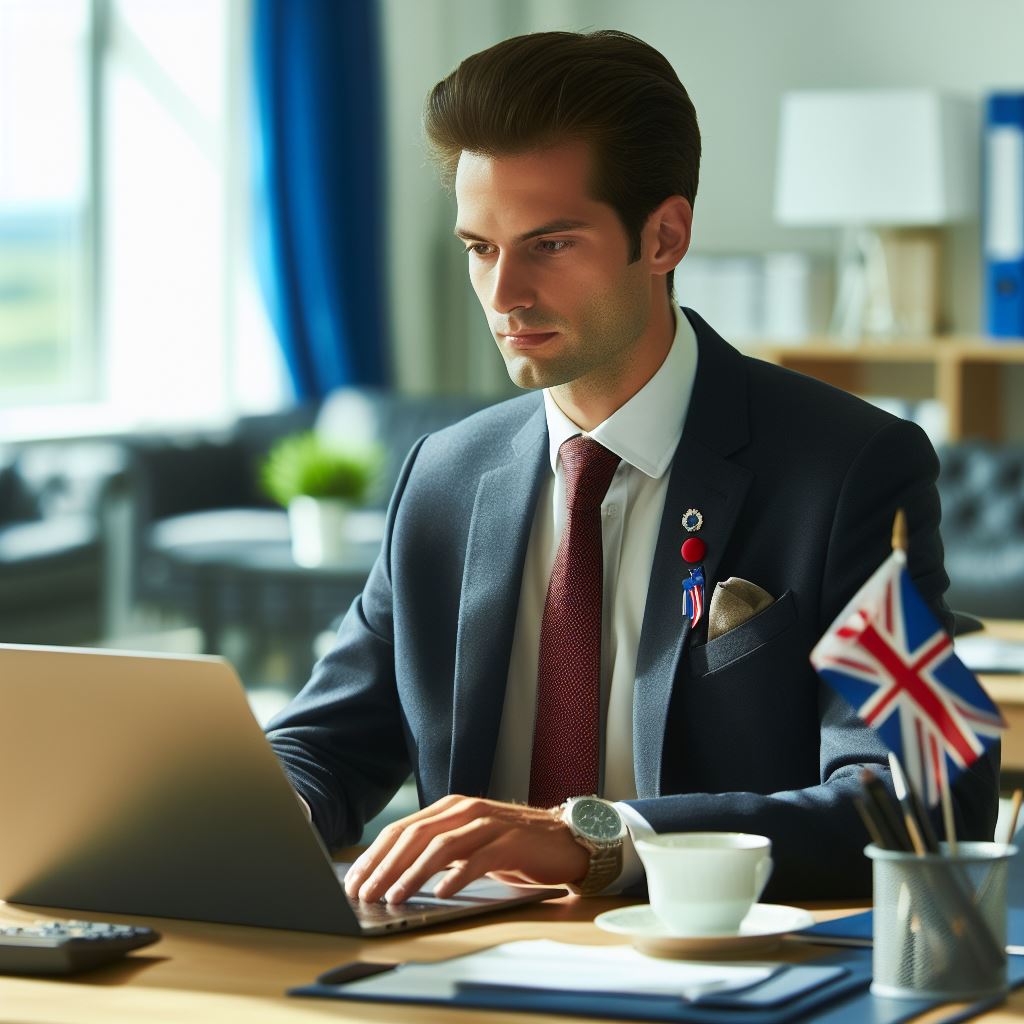Introduction
Embarking on cross-cultural interactions can be a delicate dance, requiring finesse and cultural acumen.
In this section, we delve into the art of navigating cultural differences with valuable insights from UK diplomats, who bring a distinctive perspective to the table.
Drawing from their rich experiences on the global stage, UK diplomats offer practical tips for effectively traversing diverse cultural landscapes.
These insights are a result of years spent building bridges and fostering international relations, making them a valuable resource for anyone navigating the complex tapestry of global cultures.
As we explore this topic, we’ll uncover the subtle nuances that can make or break successful interactions.
From understanding communication styles to appreciating social customs, the advice provided by UK diplomats offers a roadmap for fostering understanding and building meaningful connections across borders.
In the upcoming sections, we will delve into specific scenarios and challenges, offering concise yet powerful strategies for overcoming cultural barriers.
Whether you’re a business professional, a traveler, or an aspiring diplomat yourself, these insights will prove invaluable in navigating the intricate web of global diversity.
Join us on this enlightening journey as we tap into the wealth of knowledge accumulated by UK diplomats, gaining a deeper understanding of how to navigate cultural differences with grace, respect, and effectiveness.
Read: UK Diplomacy in Action: Key Success Stories
Understanding Cultural Differences
The Concept of Cultural Differences and its Importance in Today’s Globalized World
Cultural differences play a crucial role in today’s globalized world.
As boundaries continue to dissolve and intercultural interactions become more prevalent, it is vital for individuals to comprehend the concept of cultural differences and its implications.
This blog post explores the importance of understanding cultural differences and the challenges individuals may face when navigating diverse cultures.
The concept of cultural differences refers to the variations in norms, values, beliefs, behaviors, and customs that exist between different groups of people.
These differences arise from various factors such as history, geography, religion, language, and socioeconomic backgrounds.
In a globalized world, it is common to encounter individuals from different cultures, making it essential to learn how to navigate and appreciate these variations.
Challenges Individuals may face when Interacting with People from Different cultures
When interacting with people from different cultures, individuals may encounter several challenges.
Miscommunication is one significant challenge, as language barriers or differences in nonverbal cues can lead to misunderstanding.
Moreover, cultural differences in communication styles, such as directness or indirectness, can create confusion or offense if not understood.
It is crucial to approach such interactions with an open mind and willingness to adapt to different cultural norms.
Another challenge individuals face relates to cultural etiquette and customs. Each culture has its own set of social norms and expectations, including greetings, gestures, dress codes, and table manners.
Ignorance or disregard of these customs can lead to discomfort, embarrassment, or inadvertently offending someone.
Being aware of and respecting different cultural practices helps foster positive and respectful interactions.
Personalized UK Career Consulting
Receive tailored career guidance designed just for you. Get actionable steps and expert support to boost your career in 1-3 days. Take control of your career now.
Get StartedThe significance of understanding and appreciating cultural differences in various contexts, such as business, diplomacy, and daily life
Understanding and appreciating cultural differences offer several benefits in various contexts.
In the business realm, recognizing cultural nuances can help build stronger relationships with international clients and partners.
It allows for more effective negotiation and collaboration by acknowledging and respecting different business practices, decision-making processes, and hierarchy structures.
Furthermore, cultural sensitivity can prevent misunderstandings that may lead to business failures or reputational damage.
In diplomacy, cultural competence is crucial for effective international relations. Diplomats need to navigate cultural differences to avoid diplomatic incidents, misinterpretations, or conflicts.
By understanding the cultural context, values, and perspectives of other countries, diplomats can foster mutual understanding and build trust.
This understanding enables them to anticipate potential challenges and work towards finding common ground.
On a daily life level, cultural awareness promotes tolerance, empathy, and appreciation for diversity in communities.
It enables individuals to gather insights into different perspectives, break down stereotypes, and foster inclusivity.
Understanding cultural differences leads to a more harmonious coexistence by fostering respect, acceptance, and celebration of the richness that diversity brings.
To effectively understand and navigate cultural differences, individuals can adopt certain strategies.
Firstly, they should engage in self-reflection and examine their own cultural biases and assumptions.
This self-awareness helps individuals approach cross-cultural interactions with an open mind and non-judgmental attitude.
Secondly, individuals can educate themselves about different cultures through research, reading, or attending cultural events.
Your Dream Job Starts with a Perfect CV
Get a tailored CV and cover letter that captures your unique strengths and stands out in your industry. Let us help you make an unforgettable first impression.
Get StartedThis knowledge enhances their understanding of cultural practices and values.
Thirdly, individuals should actively listen and ask questions during intercultural interactions, demonstrating a willingness to learn and appreciate diverse perspectives.
Most importantly, understanding cultural differences is critical in today’s globalized world.
It helps individuals overcome challenges that arise when interacting with people from different cultures, fosters better business and diplomatic relations, and promotes harmonious coexistence in daily life.
By embracing cultural diversity, individuals can broaden their horizons, strengthen relationships, and contribute to a more inclusive and interconnected world.
Read: Interview Tips for UK Civil Service
The Role of UK Diplomats
UK diplomats play a crucial role in representing the country’s interests abroad.
Their work goes beyond political negotiations and economic partnerships, as they also act as cultural bridge builders.
Navigating and Bridging Cultural Differences
One of the key responsibilities of UK diplomats is the ability to navigate and bridge cultural differences. This is essential to foster strong international relationships and promote mutual understanding.
1. Act as Cultural Ambassadors
Diplomats act as cultural ambassadors, representing the best of their own country’s values and traditions while respecting and appreciating diverse cultures.
2. Understand Cultural Nuances
UK diplomats possess a deep understanding of cultural nuances, recognizing that different cultures have unique norms, values, and ways of conducting business.
3. Adapt Communication Styles
Effective communication is at the heart of diplomacy. Diplomats must adapt their communication styles to fit the cultural context, ensuring their message is clear and well-received.
4. Mediate and Resolve Cultural Misunderstandings
Cultural misunderstandings can often arise in international relations.
Diplomats play a crucial role in mediating and resolving these issues, finding common ground and fostering mutual respect.
Optimize Your LinkedIn for Success
Boost your LinkedIn profile with a professional bio, keyword-rich headline, and strategic recommendations that attract recruiters. Stand out from the crowd and get noticed.
Optimize NowExpertise and Experiences of UK Diplomats
UK diplomats are known for their expertise and experiences in understanding and effectively communicating across cultures.
1. Language Proficiency
Diplomats undergo rigorous language training to develop proficiency in the local language of their diplomatic postings. This allows for better cross-cultural communication and understanding.
2. Cultural Immersion
UK diplomats often immerse themselves in the local culture of their posting, gaining firsthand experience and insights into the nuances of that society.
3. Extensive Networking
Building strong relationships and networks is a core part of a diplomat’s role. UK diplomats leverage their networks to bridge cultural differences and facilitate cooperation.
4. Continuous Learning
Diplomats engage in continuous learning and professional development to stay updated on cultural trends and dynamics across different regions of the world.
In general, UK diplomats play a vital role in representing the country’s interests abroad.
Their ability to navigate and bridge cultural differences is crucial in building strong international relationships.
With their expertise and experiences, they effectively communicate and foster mutual understanding across diverse cultures.
Read: Navigating UK Civil Service Exams

Delve into the Subject: The Role of UK Diplomats in International Crises
Find Out More: Understanding Civil Service Pay Scales
Tips from UK Diplomats
Developing Cultural Awareness and Sensitivity
One of the first steps in navigating cultural differences is developing cultural awareness and sensitivity.
This involves being open-minded and curious about different cultures, recognizing that there are diverse ways of thinking, communicating, and behaving.
UK diplomats emphasize the importance of actively educating yourself on cultural norms, values, and traditions.
By understanding these cultural nuances, you can avoid misunderstandings and show respect to individuals from different backgrounds.
Engaging in cultural exchange programs or language courses is another effective way to enhance your understanding of different cultures.
By immersing yourself in a new cultural environment, you can gain firsthand experience and learn to appreciate different perspectives.
This not only helps to bridge cultural gaps but also fosters meaningful connections with people from different backgrounds.
Effective Communication
When it comes to cross-cultural interactions, effective communication is key.
Active listening and nonverbal communication play a significant role in understanding and connecting with individuals from different cultures.
UK diplomats stress the importance of listening attentively and being aware of nonverbal cues, such as body language and facial expressions.
These nonverbal signals can often convey more meaning than words themselves.
It is also essential to be mindful of cultural communication styles. Different cultures have varying preferences for directness, indirectness, and formality.
As such, it is crucial to adjust your communication approach accordingly.
Seeking clarity by asking clarifying questions and paraphrasing can help avoid misunderstandings and ensure that your messages are accurately interpreted.
Cultural Etiquette and Respect
Cultural etiquette norms differ from country to country and region to region. Understanding and adhering to these customs is essential when interacting with individuals from different cultures.
UK diplomats recommend familiarizing yourself with local customs and practices before traveling or engaging with people from other cultures.
Showing respect for different cultural traditions, beliefs, and religions is fundamental.
It is important to be mindful of your actions and words, avoiding anything that might be considered offensive or disrespectful.
Building Relationships and Trust
Building relationships and trust is crucial in many cultures, particularly in the business and diplomatic contexts.
UK diplomats emphasize the significance of investing time and effort in nurturing relationships over the long term.
Finding common ground and understanding hierarchical structures can help establish rapport and build trust. This involves recognizing and respecting the different roles and positions within a culture.
Patience is essential when building relationships with individuals from different cultures. It takes time to understand and appreciate the complexities of another culture.
By demonstrating patience and a genuine interest in learning about the other person’s culture, you can foster stronger connections and mutual understanding.
In today’s interconnected world, navigating cultural differences has become an essential skill.
Whether you are a diplomat representing your country or an individual working in a globalized environment.
The ability to understand and adapt to different cultures can greatly enhance your effectiveness and success.
In this blog section, we will explore some valuable tips from UK diplomats that can help you navigate cultural differences with grace and sensitivity.
Basically, navigating cultural differences requires developing cultural awareness and sensitivity, effective communication skills, respect for cultural etiquette, and building relationships based on trust.
By following these tips from UK diplomats, you can navigate cultural differences with confidence, foster meaningful connections, and promote harmony and understanding in an increasingly diverse world.
Read: Civil Service vs Private Sector: UK
Conclusion
In closing, the blog post highlighted valuable tips shared by UK diplomats on navigating cultural differences. These tips include displaying curiosity, avoiding assumptions, and embracing diversity.
By applying these tips, readers can enhance their personal and professional interactions with individuals from different cultures.
It is important to recognize that cultural differences should not be seen as barriers, but rather as opportunities for growth and learning.
By embracing cultural differences, individuals can foster greater cross-cultural understanding and collaboration.
In an increasingly globalized world, the ability to navigate cultural differences is essential for successful international relations, business transactions, and personal relationships.
By understanding and appreciating different cultures, individuals can build trust, avoid misunderstandings, and create harmonious environments.
Therefore, let us encourage readers to actively implement the tips provided by UK diplomats in their daily lives.
By doing so, they can develop the skills needed to effectively communicate across cultures, promote inclusivity, and build bridges between nations.
Therefore, embracing cultural differences is not just about being knowledgeable; it is about accepting and respecting one another’s unique perspectives.
By fostering cross-cultural understanding, we can create a more interconnected and harmonious global community.
[E-Book for Sale]
500 Cutting-Edge Tech Startup Ideas for 2024 & 2025: Innovate, Create, Dominate
$19.99 • 500 Tech Startup Ideas • 62 pages
You will get inspired with 500 innovative tech startup ideas for 2024 and 2025, complete with concise descriptions to help you kickstart your entrepreneurial journey in AI, Blockchain, IoT, Fintech, and AR/VR.




